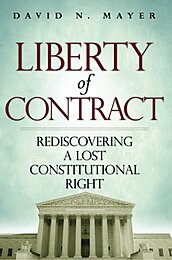Alarmed by the explosive growth of government, Americans today are more interested than ever in the U.S. Constitution and the limits it places on government power. Liberty of Contract powerfully illuminates a key limit: the right of individuals to enter into contracts with one other.
This fundamental right was protected by the Supreme Court in the early 20th century, from 1897 until the New Deal, during what is called the “Lochner era.” Named after the historic liberty-of-contract decision by the Supreme Court, the Lochner era saw the Court strike down laws that interfered with the freedom of people to bargain over the terms of their own contracts. These included minimum-wage and maximum-hours laws, housing segregation laws, licensing laws and laws interfering with the freedom of parents to determine what kind of schooling their children receive. Then in 1937, as part of the “New Deal revolution,” the Court abandoned its protection of these vital economic and personal liberties, contributing significantly to the tremendous growth in the nation’s regulatory and welfare state over the past several decades.
In this first comprehensive treatment of one of the most misunderstood and underestimated chapters in U.S. constitutional law, legal scholar David Mayer explores this lost right, identifying the foundations and nature of the Court’s Lochner-era jurisprudence. In doing so, he shatters myths that scholars have created about this era, including the notion that the Court was reading a “laissez-faire” ideology into the Constitution–as Justice Oliver Wendell Holmes asserted in his Lochner dissent. Mayer demonstrates that the old Court thus was less guilty of judicial activism than the modern Court, with its inconsistent protection of individual rights. Modern constitutional law owes much to the Lochner era, including protection of the “right to privacy,” the last remaining vestige of liberty of contract.
Read an interviewwith the author from Reason Magazine.
